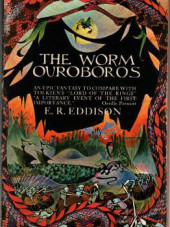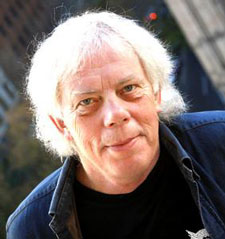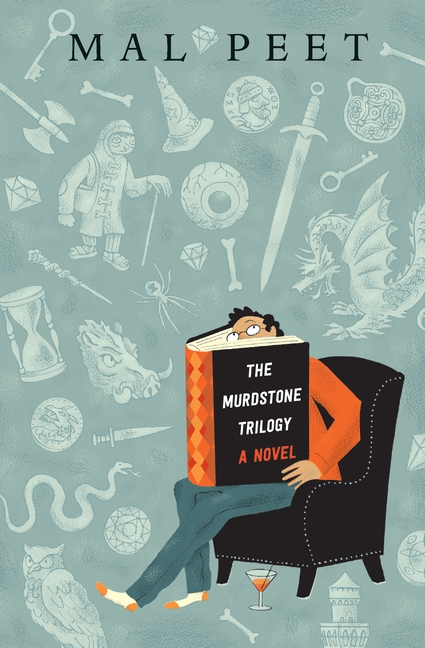 A dark epiphany has occurred! What to do if we are suddenly made aware that the allotted time in the sun of an exceptional book, published a few seasons ago, is ending in an untimely fashion, without its quality and value having been recognized? Three years after publication one has suddenly discovered that routine wholesaler backorders of our beloved book are not being filled. Its discount has been marked down to an ignominious 30%. No paperback is scheduled. The book has been all but abandoned as an enterprise, left to be swept into darkness, unmarked, hidden amidst the other literary detritus accompanying it into oblivion.
A dark epiphany has occurred! What to do if we are suddenly made aware that the allotted time in the sun of an exceptional book, published a few seasons ago, is ending in an untimely fashion, without its quality and value having been recognized? Three years after publication one has suddenly discovered that routine wholesaler backorders of our beloved book are not being filled. Its discount has been marked down to an ignominious 30%. No paperback is scheduled. The book has been all but abandoned as an enterprise, left to be swept into darkness, unmarked, hidden amidst the other literary detritus accompanying it into oblivion.
 Is this the moment to be philosophical? Perhaps Lord Gro was right when he observed that “at the last, howsoe’er we shape our course, cometh the poppy that abideth all of us by the harbour of oblivion hard to cleanse. Dry withered leaves of laurel or of cypress tree, and a little dust. Nought else remaineth.” Yet none of us should be so fatalistic as to not pick up our hands and strive to shape the course of beloved books. The arrival in oblivion’s harbor may not be staved off forever, but time in the sun is a great book’s due and in the end if we do not make the effort on its behalf ourselves why should we expect anyone else to?
Is this the moment to be philosophical? Perhaps Lord Gro was right when he observed that “at the last, howsoe’er we shape our course, cometh the poppy that abideth all of us by the harbour of oblivion hard to cleanse. Dry withered leaves of laurel or of cypress tree, and a little dust. Nought else remaineth.” Yet none of us should be so fatalistic as to not pick up our hands and strive to shape the course of beloved books. The arrival in oblivion’s harbor may not be staved off forever, but time in the sun is a great book’s due and in the end if we do not make the effort on its behalf ourselves why should we expect anyone else to?
This brings me to Mal Peet’s final book The Murdstone Trilogy, a book whose failure to find its audience is as unjust as it is ironic. Murdstone is Peet’s parting shot at the publishing industry, written as he was dying of cancer. And yet its dark humor has an incisiveness which never encumbers the reader. It has the rare quality of having been written at a very particular moment in an author’s life which books such as The Sorrows of Young Werther, The Loved One, and The Voyage Out all share, a singularity of perspective that has no regard for consequences.
 Peet’s masterpiece is the tale of an aging writer, Philip Murdstone, with an award-winning history of writing realistic issue books. Murdstone has always been a man of unflinching integrity. At present, with his sales in a pronounced slump, Philip succumbs to his cynical agent’s forceful suggestion that he get with the program and write what’s popular, an epic fantasy, the very thing he detests with all his heart and soul.
Peet’s masterpiece is the tale of an aging writer, Philip Murdstone, with an award-winning history of writing realistic issue books. Murdstone has always been a man of unflinching integrity. At present, with his sales in a pronounced slump, Philip succumbs to his cynical agent’s forceful suggestion that he get with the program and write what’s popular, an epic fantasy, the very thing he detests with all his heart and soul.
Peet takes this concept further in having Murdstone’s shocking success as a fantasy novelist fueled by a Faustian engine. Philip does not exactly write the first book himself. He receives it from a denizen of an actual fantasy realm, a Greme named named Pocket Wellfair. Pocket essentially strikes an agreement to give Philip a tale of what for him is nonfiction. Murdstone transcribes Pocket’s account and then settles in for what soon becomes a tidal wave of success, both on the financial side and in the adulation and demand for a sequel departments.
The Murdstone Trilogy succeeds at being many things: a parody of young adult fantasy, a send-up of modern publishing, authoring and media in general, and a genuine dark fantasy in its own right. It succeeds at being all these many things. So why has it not captured its audience? In large part it has to due with Peet’s longtime U.S. publisher, Candlewick, publishing the book as YA even though it is completely adult, wrongfooting the audience in terms of marketing and outreach.
So what can we do to rally round the book, and seek to pull it back from entering the harbor of oblivion untimely? The answer is obvious. Take the Murdstone Challenge.
The Murdstone Challenge
- Read these few quotes and if they draw you in at all, proceed to number 2.
 (quote 1) “Usually, in his life as well as his fiction, Philip tends to leave the weightier questions unanswered; now, in self-lacerating mode, he addresses them. Or, rather, it. His bitter self-interrogation has resolved itself into a single query: why has he agreed to sell his soul?
(quote 1) “Usually, in his life as well as his fiction, Philip tends to leave the weightier questions unanswered; now, in self-lacerating mode, he addresses them. Or, rather, it. His bitter self-interrogation has resolved itself into a single query: why has he agreed to sell his soul?
Answer: because he is broke.” (page 4)
(quote 2) “’Fantasy?’ Philip repeated the word in a whisper, as if it were something shockingly filthy that might have been overheard at the neighboring tables.
‘Or, to be more precise,’ Minerva said, ‘High Fantasy. Sometimes spelled Phantasy, with a p-h.’
‘And what is that when it’s at home in its pajamas?’
‘Tolkien with knobs on,’ Minerva said. ‘Necromancers. Dark Forces. Quests. For Mystical Objects that have got lost, usually. Goblins, gnomes, faeries, also often spelled with a p-h. Dwarves. Beards. Time and dimension shifts. Books with a deep serious message that no one understands. You know.’
‘Oh, God. Minerva, you can’t be serious.’” (page 14)
(quote 3) “All of which left Philip most uneasy. Despite the cool restraint of the prose, this was hardly suitable material for younger readers. Then he laughed at himself. What was he thinking? He had a new readership now, one that was – anatomically, at least – adult.” (page 204)
- Read the book and if you love it proceed to number 3.
- Stock up on the book and handsell it to its true audience, literary minded adults of all stripes including fantasy readers and adult readers of young adult fantasy.
Will The Murdstone Challenge have any effect on the book’s destiny? There’s no harm in phantasizing.

Love this book and completely agree with you, Kenny. We must be evangelists for Murdstone. Everyone who reads it as a result will thank us. 🙂
I agree. Ignore the misbegotten YA label and read The Murdstone Trilogy. A masterpiece, and also a great deal of fun — for me, at least, the perfect combination.
Sounds like a book that needed to be written. I’m so glad Mal Peet took care of that and did it well, before folks like me were sufficiently disgusted by the Phantasian Age to undertake a ham-handed critique.